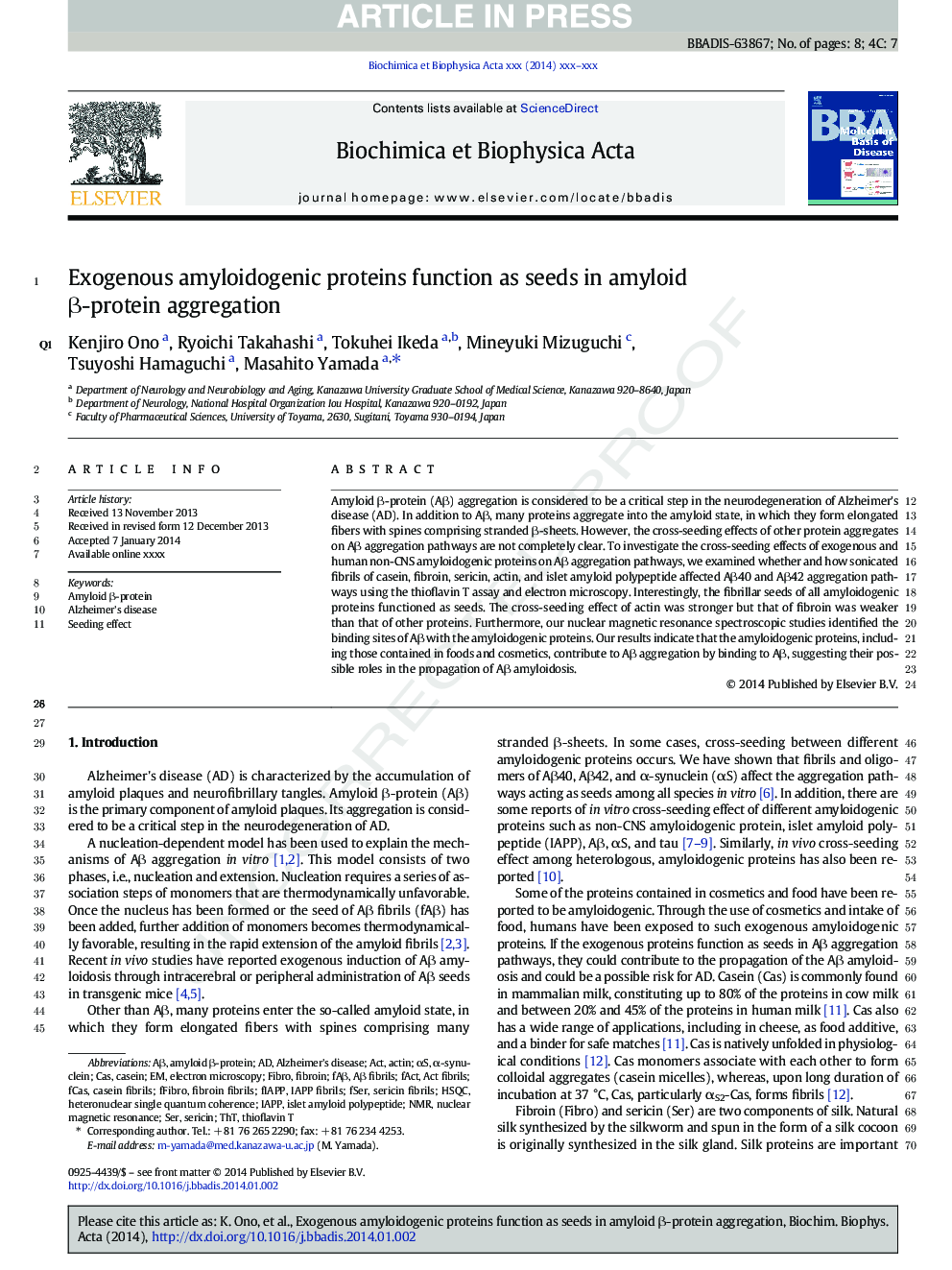| کد مقاله | کد نشریه | سال انتشار | مقاله انگلیسی | نسخه تمام متن |
|---|---|---|---|---|
| 8260398 | 1534661 | 2014 | 8 صفحه PDF | دانلود رایگان |
عنوان انگلیسی مقاله ISI
Exogenous amyloidogenic proteins function as seeds in amyloid β-protein aggregation
دانلود مقاله + سفارش ترجمه
دانلود مقاله ISI انگلیسی
رایگان برای ایرانیان
کلمات کلیدی
FCASIAPPαSHSQCACTAβCASnuclear magnetic resonance - رزونانس مغناطیسی هستهایα-synuclein - α-سینوکلینamyloid β-protein - β-پروتئین آمیلوئیدactin - اکتین SER - برای بودنThT - بلهAlzheimer's disease - بیماری آلزایمرNMR - تشدید مغناطیسی هستهای Thioflavin T - تیوفلاوین TFACT - حقیقتSericin - سرسیfibro - فیبروFibroin - فیبرینElectron microscopy - میکروسکوپ الکترونیIslet amyloid polypeptide - پلی اتیل اتیل آمیلوئیدCasein - کازئینheteronuclear single quantum coherence - یکپارچگی کوانتومی تک هسته ای
موضوعات مرتبط
علوم زیستی و بیوفناوری
بیوشیمی، ژنتیک و زیست شناسی مولکولی
سالمندی
پیش نمایش صفحه اول مقاله

چکیده انگلیسی
Amyloid β-protein (Aβ) aggregation is considered to be a critical step in the neurodegeneration of Alzheimer's disease (AD). In addition to Aβ, many proteins aggregate into the amyloid state, in which they form elongated fibers with spines comprising stranded β-sheets. However, the cross-seeding effects of other protein aggregates on Aβ aggregation pathways are not completely clear. To investigate the cross-seeding effects of exogenous and human non-CNS amyloidogenic proteins on Aβ aggregation pathways, we examined whether and how sonicated fibrils of casein, fibroin, sericin, actin, and islet amyloid polypeptide affected Aβ40 and Aβ42 aggregation pathways using the thioflavin T assay and electron microscopy. Interestingly, the fibrillar seeds of all amyloidogenic proteins functioned as seeds. The cross-seeding effect of actin was stronger but that of fibroin was weaker than that of other proteins. Furthermore, our nuclear magnetic resonance spectroscopic studies identified the binding sites of Aβ with the amyloidogenic proteins. Our results indicate that the amyloidogenic proteins, including those contained in foods and cosmetics, contribute to Aβ aggregation by binding to Aβ, suggesting their possible roles in the propagation of Aβ amyloidosis.
ناشر
Database: Elsevier - ScienceDirect (ساینس دایرکت)
Journal: Biochimica et Biophysica Acta (BBA) - Molecular Basis of Disease - Volume 1842, Issue 4, April 2014, Pages 646-653
Journal: Biochimica et Biophysica Acta (BBA) - Molecular Basis of Disease - Volume 1842, Issue 4, April 2014, Pages 646-653
نویسندگان
Kenjiro Ono, Ryoichi Takahashi, Tokuhei Ikeda, Mineyuki Mizuguchi, Tsuyoshi Hamaguchi, Masahito Yamada,